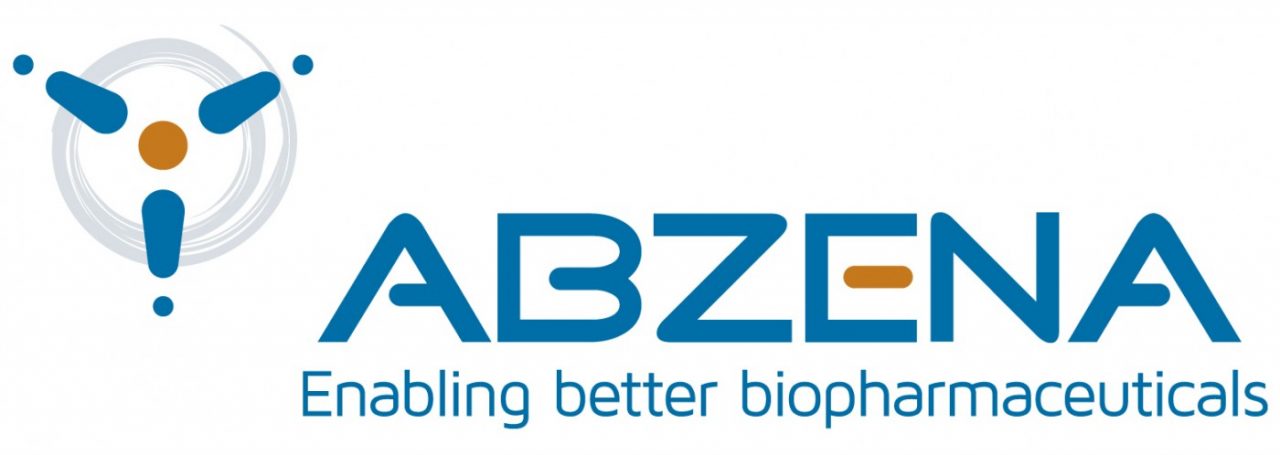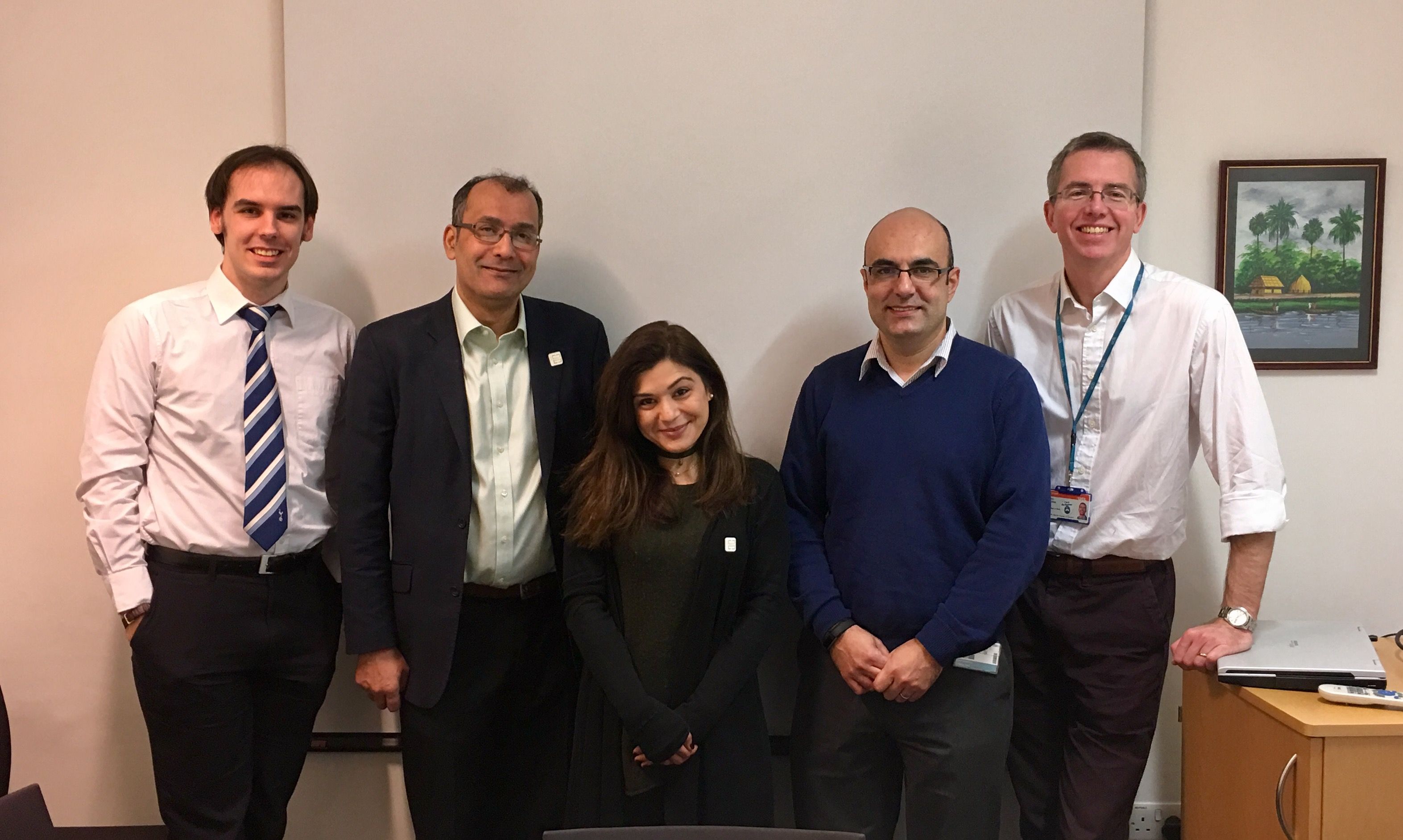Spinout News
Abzena plc and UCL Medical Research Council grant awarded to collaboration group developing novel autoimmune therapy
1 March 2017

Abzena plc (AIM: ABZA, ‘Abzena’ or the ‘Group’), a life sciences group providing services and technologies to enable the development and manufacture of biopharmaceutical products and UCL (University College London), one of the world’s leading multidisciplinary universities, supported by UCL Business, the technology commercialisation company of UCL, announce that a research group from UCL’s Centre for Rheumatology has been awarded a £3.5m grant from the Medical Research Council (MRC) to progress the development of a novel treatment for anti-phospholipid syndrome (APS) which uses Abzena’s proprietary conjugation technology.

L-R: Dr Thomas McDonnell, Prof Anisur Rahman, Dr Charis Pericleous, Dr John Ioannou and Dr Ian Giles.
APS is a disorder of the immune system, where abnormal antibodies, called antiphospholipid antibodies (aPL) are produced. These bind to beta-2-glycoprotein (beta-2-GPI) in the blood and increase the risk of clotting. Patients with APS are more likely to have a stroke or heart attack and pregnant women with APS have an increased risk of recurrent miscarriage. The condition can occur on its own or alongside other autoimmune disorders. Patients are currently treated with anticoagulants, such as warfarin, but these are associated with a significant risk of bleeding so there is a need for alternative therapies.
Abzena has a longstanding collaboration with Professor Anisur Rahman and his team at UCL who identified that an agent derived from a part of the beta-2-GPI molecule known as Domain I (DI) blocked the binding of aPL to beta-2-GPI. In pre-clinical studies DI prevented aPL from causing clotting. The team has also used Abzena’s technology to modify DI in a way designed to extend the time that it remains in circulation in the blood. This is significant as patients with APS are expected to require treatment for life, so it reduces the frequency with which medication would need to be dosed.
The grant is part of the MRC’s Developmental Pathway Funding Scheme award and builds upon previous funding from Arthritis Research UK and the MRC. The funding will enable the lead product to be selected, material to be produced for preclinical studies, and the studies to support a clinical trial application to be completed ready for this potential new treatment to be taken into clinical development.
Dr John Burt, Abzena’s CEO, said: “Our collaboration with the UCL team is proving successful with a promising candidate now identified. Thanks to the grant, UCL now has the funds to move towards the clinic and we look forward to further supporting the programme in the next stage of its development.”
Professor Anisur Rahman, Professor of Rheumatology at UCL said: “This collaboration has been a team effort for the last decade. Working with an industrial partner has been a key feature of the project as both the academic and industry partners provided complementary expertise and looked at the project from different viewpoints. In addition, we have a good relationship with patient groups particularly APS Support UK so we can obtain a good idea of what patients need from new therapies in this syndrome.”
Lynne Kirwin, CEO of APS Support UK, said: “We welcome the award of this grant to this valuable research initiative. We have had the opportunity to work closely with UCL research team in recent years, providing feedback from patients on the therapies currently available for APS. The possibility of a new treatment will undoubtedly give hope to patients and will be warmly welcomed by clinicians working in the field.”
Enquiries:
Abzena plc
John Burt, Chief Executive Officer – Julian Smith, Chief Financial Offier – +44 1223 903 498
Instinctif Partners (media relations for Abzena)
Melanie Toyne Sewell – Rozi Morris – +44 20 7457 2020 – abzena@instinctif.com
UCL media relations
Harry Dayantis – +44 20 3108 3844 – h.dayantis@ucl.co.uk
About Abzena
Abzena (AIM: ABZA) provides proprietary technologies and complementary services to enable the development and manufacture of biopharmaceutical products, a growing area that requires specialist knowledge and expertise. The Group has a global customer base which includes the majority of the top 20 biopharmaceutical companies as well as large and small biotech companies and academic groups.
The term “Abzena inside” is used by Abzena to describe products that have been created using its proprietary technologies and are being developed by its partners, and include Composite Human Antibodies™ and ThioBridge™ Antibody Drug Conjugates (ADCs). Abzena has the potential to earn future licence fees, milestone payments and/or royalties on “Abzena inside” products.
Abzena offers the following services and technologies across its principal sites in Cambridge (UK), San Diego, California (USA) and Bristol, Pennsylvania (USA).
- Immunogenicity assessment, protein engineering to create humanized antibodies and deimmunised therapeutic proteins, and cell line development for manufacture.
- Contract process development and manufacture of biopharmaceuticals, including monoclonal antibodies, recombinant proteins, vaccines, and gene therapy and cell therapy products, for preclinical and clinical studies.
- Proprietary site-specific conjugation technologies for antibody drug conjugate development and solutions for optimizing the therapeutic properties of biopharmaceuticals.
- Contract chemistry and bioconjugation business focused on ADCs and is establishing the capability to manufacture ADCs to GMP standards.
For more information, please see www.abzena.com
About UCL (University College London)
UCL was founded in 1826. We were the first English university established after Oxford and Cambridge, the first to open up university education to those previously excluded from it, and the first to provide systematic teaching of law, architecture and medicine. We are among the world’s top universities, as reflected by performance in a range of international rankings and tables. UCL currently has over 38,000 students from 150 countries and over 12,000 staff. Our annual income is more than £1 billion.
www.ucl.ac.uk – Follow us on Twitter @uclnews – Watch our YouTube channel YouTube.com/UCLTV
About UCL Business PLC
UCL Business PLC (UCLB) is a leading technology commericalisation company that supports the research and innovations arising from UCL, one of the UK’s top research-led universities. UCLB has a successful track record and a strong reputation for identifying and protecting promising new technologies and innovations from UCL academics. UCLB has a strong track record in commercialising medical technologies and provides technology transfer services to UCL’s associated hospitals; University College London Hospitals, Moorfields Eye Hospital, Great Ormond Street Hospital for Children and the Royal Free London Hospital. It invests directly in development projects to maximise the potential of the research and manages the commercialisation process of technologies from laboratory to market.
For further information, please visit: www.uclb.com – Twitter: @UCL_Business